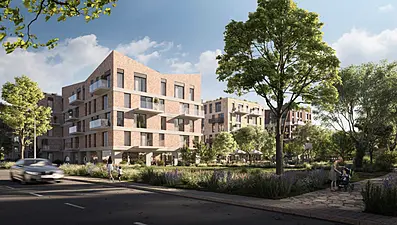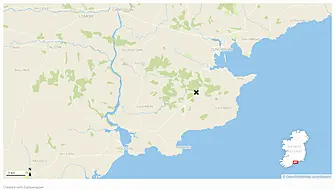An Bord Pleanála has described a request for further hearing of legal argument in a High Court action concerning a controversial housing development planned on a site at Dublin’s South Circular Road as “stunning”.
The Court of Justice of the European Union (CJEU) last week determined legal questions in the case that had been referred to it by the High Court’s Mr Justice Richard Humphreys in November 2021.
Mr Justice Humphreys had already dismissed, in May 2021, all domestic law grounds of challenge in the action brought by local residents Sinéad Kerins and Mark Stedman aimed at overturning the board’s permission for the five-block build-to-rent development, including a 16-storey tower, to a subsidiary of US property group Hines.
The planned strategic housing development for 416 homes received permission from An Bord Pleanála in September 2020 against the recommendation of its inspector.
The Irish proceedings were paused while the European court considered four complex questions put to it relating to environmental assessments and building height guidelines.
The CJEU found, among other things, that a master plan prepared jointly by Dublin City Council and Hines, which encompasses the development site, would only come within the scope of the Strategic Environmental Assessment (SEA) Directive if it was binding, which it is not.
Among the applicants’ grounds of challenge that were still active at the point of reference was one complaining that the development permission relied on a master plan that was not subject to an SEA.
In a statement on Friday, Hines welcomed the CJEU’s decision, saying it “looks forward to the swift conclusion of the proceedings” so it can progress delivery of the homes at the former Bailey Gibson lands. It was expected that it would seek to have the case dismissed on Monday.
However, after hearing from all parties in the action on Monday, Mr Justice Humphreys scheduled the matter for further hearing on March 27th. He said it was the convention that Irish proceedings resume after the European court gives its decision.
'Carefully worded' judgment
Earlier, counsel for the applicants, Peter Bland SC, said a resumed hearing is required to resolve issues following the CJEU’s judgment. He said the European court’s judgment was “carefully worded” and the Irish High Court might interpret it differently to the other parties.
For the board, Brian Foley SC, described submissions made by the applicants and the request for further hearing as “stunning”. He said the applicants’ case was supposed to fail if the CJEU responded “no” to the questions referred to it.
However, “if it (further hearing) has to happen, it has to happen”, he added.
The developer, the DBTR-SCR1 Fund, a sub-fund of TWTC Multi-Family ICAV, expressed surprise and concern at the applicants’ position. The developer’s counsel, Aoife Carroll BL, said the CJEU has answered the questions clearly and the case should be dismissed.
She said the court has determined that the area master plan is not within the scope of the SEA directive.
Ms Carroll said her client, a notice party in the action, is “quite concerned” that the applicants appear to be trying to “unpick matters that have been settled”. She wanted this heard as quickly as possible and noted the “significant delays” in the case, given the time involved in questions being referred to Europe.

Further legal argument should take no more than an hour, she added.
Emily Egan McGrath BL submitted that her clients, Ireland and the Attorney General, should be excused from appearing further in the case as, she said, the CJEU’s judgment clearly settles the legal issues concerning her clients.
Mr Bland confirmed his clients do not feel there are outstanding legal issues that concern the State parties.
Ms Kerins, of Rehoboth Place, Dolphins Barn, Dublin 8, and Mr Stedman, of Elford Terrace, Donore Avenue, Dublin, brought the case arising out of local concerns about the planned build, including about its height, density and traffic implications.







